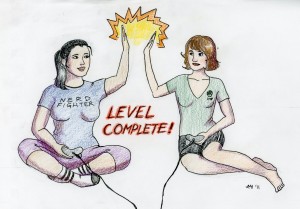It’s Not “Game Over” Yet: Fantasizing Identity
 Melody Strmel (’12) sits on the floor, mashing buttons on her Xbox controller as she plays through the latest installment of the Dragon Age sequence. Hope Whitney-Monical (’11), also a fan of the Xbox, prefers Dead Rising. You might not know it, but there is an avid community of Scripps students who play video games – though they might not be aware of exactly how many other students actually play video games or have consoles.
Melody Strmel (’12) sits on the floor, mashing buttons on her Xbox controller as she plays through the latest installment of the Dragon Age sequence. Hope Whitney-Monical (’11), also a fan of the Xbox, prefers Dead Rising. You might not know it, but there is an avid community of Scripps students who play video games – though they might not be aware of exactly how many other students actually play video games or have consoles.
Videogames and females, videogames and women. Not what you would typically think of as an avenue for self-reflection and well-being, and not what you might think of when you envision a Scripps student. Although video games are controversial for the stereotypical women they portray – women with tiny waists and enormous breasts – it is not about who or what is portrayed in the game. More than affecting the way that women view their bodies, video games can help women’s well-being. Despite many of the misconceptions that accompany video games, such as they are often associated with masculinity and foster antisocial behavior, they also have very positive effects, such as boosting confidence, acting as a way to release steam after a rough day or week, and promoting social interaction. Instead of using it as a method of escapism, video games can foster friendships and even be a space where anyone can reinvent themselves – but especially women, helping in part to reinvent what femininity means.
Many gamers typically start playing games because someone in their family or a friend had a game console. Friends can turn a single-player game into a multiplayer game merely by designing different characters, and by doing so can create a social network. Such connections help to foster a community of gamers, who enjoy relaxing together, are interested in one another’s games, and enjoy the relief that video games can provide. Additionally, multiplayer games like Halo can create a larger party of people who are interested in games and getting together.
Although the games can be used as a means of relaxation, much like reading a novel or watching episodes of a favorite television show, they also allow identity-play. One of the most important and empowering features of videogames is their ability to imagine a world where an identity is fluid and can be changed merely by restarting the game – and sometimes even within the same iteration. For example, in Dragon Age, the gamer can choose to be a man or woman of three different races: human, elf, or dwarf. And aside from relationships, gender is almost negligible in the Dragon Age games. Abilities, interactions with other characters, and even storylines are different depending on your race and how the gamer chooses to play the character. This dynamic not only adds to the re-playability of the game, but gamers can now explore what it means to play as a male or a female character. Even if there is not a noticeable difference in the way that female characters are treated, it is empowering to have the option to play as a female.
Malleable character design allows gamers to ask themselves questions, bringing a sense of play and expression of an inner being, or what they want their inner being to be, to videogames. However, this is a low-risk environment because gamers do not have to commit to anything. While exploring these options, gamers can change them. It is particularly valuable for females to have that kind of power and ability for self-invention, mostly because there are more restrictions on females and femininity than males and masculinity.
Playing a videogame can allow people to explore other modes of being, serving as a staging-ground for what one can be. Although Hope Whitney-Monical acknowledges that there are ample opportunities for women to find empowerment in today’s society, playing video games is a unique space to do so and has lower risks than other spheres. Self-exploration through video games is more personal and can be private, and allows women to explore options that they do not normally have.
For now, as Melody and Hope mash their buttons, they continue to challenge the assertion that only boys play video games. In doing so, they play with their identities and help make an ostensibly male-dominated industry friendlier to all genders.

![[in]Visible Magazine](https://community.scrippscollege.edu/invisible/wp-content/uploads/sites/5/2011/04/Invisible-Masthead-2011-Spring1.png)







No comments yet... Be the first to leave a reply!